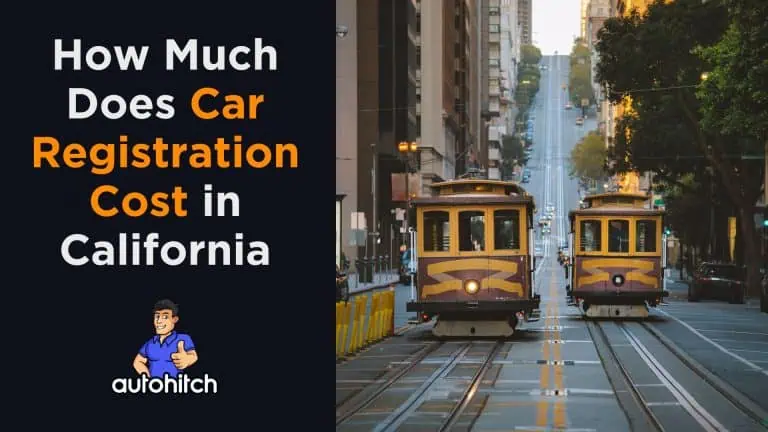The Cost of Car Registration in California and Why It’s So Expensive
California has some of the highest car registration fees in the United States.
The cost of registering a vehicle in the state can range from a few hundred dollars to over $1,000, depending on your various circumstances.
Here’s a breakdown of the fees and why they are so high.
Related Article to Read: How Long Does a Smog Check Take?
Table of Contents
Registration Fees in California
First Time Registering The Car
The primary fees associated with car registration in California include:
| Fee | Amount |
|---|---|
| Registration Fee | $46 |
| California Highway Patrol (CHP) Fee | $23 |
| Vehicle License Fee (VLF) | 0.65% of the vehicle’s value |
| Transportation Improvement Fee | $27 – $192 (based on vehicle value) |
| County/District Fees | Varies by location |
The Vehicle License Fee (VLF) is a significant contributor to the high registration costs in California. It is calculated as 0.65% of the vehicle’s value, which means that for a $30,000 car, the VLF would be $195.
Registration Renewal Fees (Lower Cost)
The good news is that the cost of renewing vehicle registration in California is lower than registering a new car for the first time. For a renewal, the main fees you pay will be:
- Registration Renewal Fee (around $46-$60 depending on vehicle type)
- California Highway Patrol Fee (around $28-$32)
- Vehicle License Fee (0.65% of the vehicle’s value)
- County/District Fees ($7-$47 depending on county)
- Smog Abatement Fee ($25 if applicable)
So, for renewal, the total can range from around $150-$300 or more, depending on the vehicle’s value and county.
Sources:
- https://www.dmv.ca.gov/portal/vehicle-registration/registration-fees/
- https://www.dmv.ca.gov/portal/vehicle-registration/registration-fees/penalties/
Why Car Registration is So Expensive in California
There are several reasons why car registration fees are so high in California:
- Road Maintenance and Infrastructure: A significant portion of the registration fees goes towards maintaining and improving the state’s vast network of roads and highways. California has an extensive transportation infrastructure that requires constant upkeep and repairs.
- Environmental Programs: California has implemented various environmental programs aimed at reducing air pollution and promoting sustainable transportation. Some of the registration fees are allocated to these initiatives, such as the Air Resources Board and the California Highway Patrol’s efforts to enforce emissions regulations.
- Vehicle Weight and Emissions: Heavier vehicles and those with higher emissions generally have higher registration fees. This is an attempt to incentivize the use of more fuel-efficient and environmentally friendly vehicles.
- Vehicle Value: As mentioned earlier, the Vehicle License Fee is based on the value of the vehicle, which means that more expensive cars will have higher registration fees.
- Funding for State Programs: Registration fees also contribute to funding various state programs, such as the California Department of Parks and Recreation’s Off-Highway Motor Vehicle Trust Fund.
Recent Increases in Car Registration Fees
In 2017, the California legislature passed Senate Bill 1, which increased the state’s gas tax and implemented additional fees for electric and hybrid vehicles.
Starting in 2020, electric vehicle owners were required to pay an annual fee of up to $175, based on the vehicle’s value. This fee was introduced to offset the lack of gas tax contributions from electric vehicles.
Related Articles To Read:
Late Fees for Car Registration in California
If you fail to renew your car registration on time in California, you will be subject to late fees.
The penalties are calculated as a percentage of the vehicle license fee and weight fee, plus additional flat fees.
The longer you delay the renewal, the higher the penalties will be.
For example, if you are 1-10 days late, you will pay 10% of the vehicle license fee and weight fee, plus a $10 registration late fee and a $10 CHP late fee. If you are 31 days to one year late, the penalties increase to 60% of the vehicle license fee and weight fee, plus a $30 registration late fee and a $30 CHP late fee.
How Often to Renew Registration in California
Car registrations in California must be renewed annually. The DMV will send a renewal notice approximately 60 days before the expiration date.
Can you Get a Refund?
Refunds for car registration fees are generally not available in California unless there are exceptional circumstances, such as the vehicle being sold or permanently moved out of state.
Payment Methods
You can pay for your car registration in California using various methods, including credit cards, debit cards, checks, and cash (if paying in person).
Military Exemptions
Active-duty military personnel stationed in California, along with their spouses, are exempt from paying the Vehicle License Fee (VLF) when registering their vehicles. However, they are still responsible for paying the other registration fees.
Is Car Registration Tax Deductible?
In California, car registration fees are considered personal expenses and are generally not tax-deductible for individual taxpayers. However, if you use your vehicle for business purposes, a portion of the registration fees may be deductible as a business expense.
My Final Thoughts
It seems getting a car registered in California is extremely expensive and likely to continue to rise as the state continues to have budget concerns.
But, if we have left anything out that you need help with in getting a registration for a car in California, please write your questions in the comments below.



